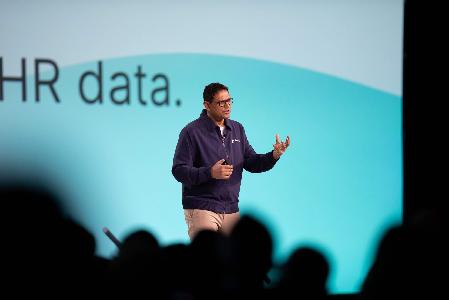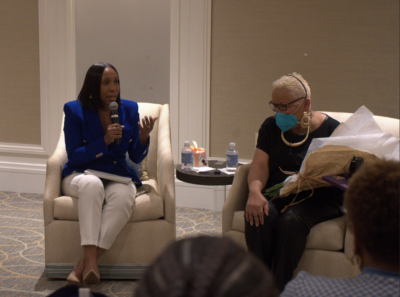Johns Hopkins University President Ronald Daniels has seen plenty of innovation at the world-renowned research institution he leads. In opening a second incubator in East Baltimore, university officials believe they can get another benefit from the innovation.
“It’s happened before at Hopkins and it’ll happen again,” Daniels said of inventions that come out of the university. “But this time, we’re going to make some money on it.”
On Tuesday, the university officially opened FastForward East, the second incubator location of the startup accelerator run by John Hopkins Technology Ventures. Currently, the incubator is located steps from the university’s medical campus in the Rangos building. The 3,500-square-foot space is full of desks, six offices and shared conference area space. It connects directly with a new Atwater’s that just opened next door.
The companies don’t have to be connected to the university, but they’re all a part of the FastForward accelerator. While some of the offices were clearly already taken, there’s still space left.
While officials talk up the popularity of FastForward at its first location on the Homewood Campus, the demand for the new space is perhaps most evident on a quiet hallway on the sixth floor of the Rangos Building. That’s where FastForward East’s wet lab space is currently located.
“This was the last lab space available in Baltimore city,” said Ian Tolfree, FastFoward’s Venture Manager.
Creating the space wasn’t cheap.
A pair of fume hoods cost $130,000 to install, and a freezer that can keep specimens at a crisp -80 degrees cost $10,000 alone. Overall, companies will have access to $150,000 worth of shared equipment. Rent is $800 a month.
Demand is already evident, as three companies are already sharing the two lab spaces, Tolfree said. One of the companies using the space, Gemstone Biotherapeutics, is working on stem cell research that originated with the work of cofounder and Hopkins professor Sharon Gerecht.
As Hopkins President Daniels indicated, the school isn’t offering the low-cost rents out of charity.
Expanding FastForward East — and bringing in the equity that the startups who participate in the accelerator must contribute — is specifically designed to nurture companies that will prove to be successful. The university is tops in the country for research spending, but has notoriously lagged behind when it comes to commercializing the groundbreaking research developed there.
For instance, Gerecht was recently awarded the university’s inaugural President’s Frontier Award. The $250,000 prize will go toward advancing her research as a faculty member. But it’s easy to envision an advancement in the future also becoming part of Gemstone’s work at FastForward.
Hopkins making money is also likely to be good for the city’s larger entrepreneurial community. Along with FastForward, Hopkins is an equity partner in the DreamIt Health Baltimore accelerator, which is currently running its second cohort at a new coworking space in Power Plant Live.
DreamIt Health grads are already heeding the call.
At the end of the month, emocha will be moving from the Emerging Technology Centers’ Haven Street campus to FastForward East. Marketing Director Morad Elmi said the company has loved working at ETC, but sees the move as a “natural progression.” He and founder Sebastian Seiguer are both graduates of Hopkins’ business school, and the three-person advisory board that invented emocha are all Hopkins faculty. Additionally, many of the clients for the company’s mobile health platform are clinicians at the university, Elmi said.
DreamIt Health Philadelphia grad Tissue Analytics is also one of the new FastForward East tenants. The company, which makes an app that provides medical imaging on smartphones, was founded by two biomedical engineers from Johns Hopkins.
Right now, five of the six companies in DreamIt Health Baltimore’s current class are from outside of the city. The accelerator’s managing partner Jason Hardebeck, who used to run the Greater Baltimore Technology Council, isn’t shy about saying that he wants the companies to stay in Baltimore once they’ve finished the accelerator. Likewise, he believes healthtech is an area that is poised to join edtech, adtech and cybersecurity as one of Baltimore’s top tech sectors.
“The startup activity around healthcare has not caught up to the potential,” he told the new DreamIt Health Baltimore class as they began the 16-week program last month.
Though they’ve been a little shy in the past, Hopkins finally seems ready to up its game. Though a big unveil this week featured officials like DBED Secretary Mike Gill and Baltimore Mayor Stephanie Rawlings-Blake, FastForward East is planning to grow beyond its current space.
Plans call for the incubator to be relocated across the street to a 30,000-square-foot space in the next building that’s slated for JHU’s Science and Technology Park.
Join the conversation!
Find news, events, jobs and people who share your interests on Technical.ly's open community Slack

This Black gaming advocate has a mission to transform education through esports

Is AI really something new — or just the next big technology platform?

This Week in Jobs: Get out there with 22 new job opportunities available to you!







